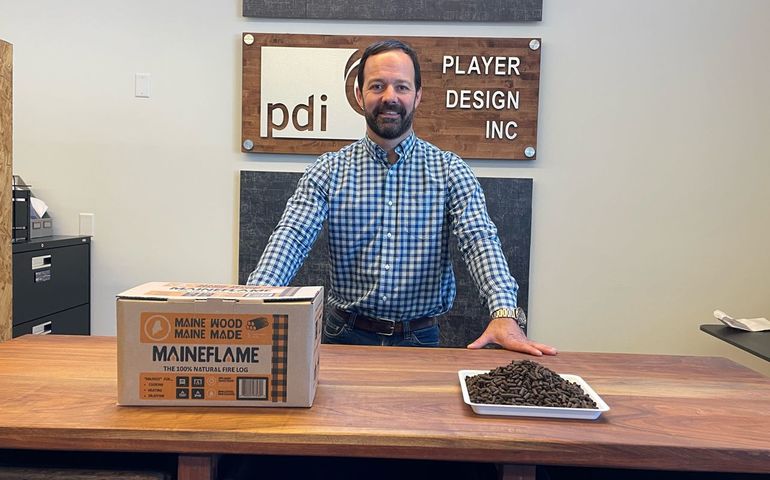
Presque Isle company grows its wood-to-energy business
 Courtesy / Player Design
Tyler Player is seen here with MaineFlame logs and steam-exploded black pellets his firm will be manufacturing in Ashland.
Courtesy / Player Design
Tyler Player is seen here with MaineFlame logs and steam-exploded black pellets his firm will be manufacturing in Ashland.
Tyler Player founded Player Design Inc. in Presque Isle in 2008, added Ashland log manufacturer MaineFlame Inc. in 2020 and acquired fabrication shop K-Pel Industrial Services Inc. in Fort Fairfield in 2022.
MaineFlame has now proposed a $7 million expansion of its plant to add the production of steam-exploded wood pellets for heating and industrial power needs domestically and overseas.
The project inspired curiosity about Player Design, which tends to keep a low public profile but has worldwide operations. We asked Player about his company and how it unfolded.
Mainebiz: What does Player Design do?
Tyler Player: We design and build large-scale industrial machinery for wood products and food recycling operations. In particular, our proprietary energy and drying systems are often applied to the renewable energy sector. As the demand for better energy answers has grown, we have grown with it. Our patented furnaces and other solutions allow our clients to compete on a global scale with biomass products, which is a cornerstone of meeting ongoing renewable energy goals.

MB: What’s one of your early projects?
TP: We designed and built the wood pellet manufacturing plant operated by Wood & Sons in Sanford – the rotary drum dryer and the biomass furnace. The project uses sawmill waste to manufacture high-grade pine pellets for residential heating. Pellets are the mainstream wood-to-energy commodity that everyone knows and we have been a technology piece in that business since our inception. The level of growth we have had in that industry is consistent with how much more that industry stands to provide in the overall energy sector.
MB: What’s a more recent project?
TP: A more recent project is J.D. Irving [a privately owned conglomerate headquartered in Saint John, New Brunswick]. They are doing an expansion of their pellet mill in St. Leonard, New Brunswick.
We’re putting in a rotary dryer that’s 14 feet around and 65 feet long and weighs 125,000 pounds. The project is to handle sawmill residuals and manufacture wood pellets to replace coal in electricity production. Our dryer drums, for the most part, come out of Montréal. We subcontract that part of the fabrication, but in the last year we have added our own fabrication shop with the purchase of K-Pel in Fort Fairfield.
This project illustrates one of the strengths of Player Design. As a Maine-based firm, we are known worldwide in the growing wood-to-energy business. As that demand grows, our technology and research is being increasingly sought after. This is a win for not only our Maine-based business, but also under-utilized wood in northern Maine.
Our most recent project is, of course, our announcement on the steam-exploded pellet. This is the natural evolution of our technological innovation in the wood-to-energy world.
MB: What’s your background?
TP: Born and raised in Aroostook County, I graduated from Presque Isle and went on to UMaine for engineering. After finishing my degree, I returned home and worked for Huber Engineered Woods and McCain Foods [respectively, a building productions innovator based in Charlotte, N.C., and a Canadian multinational frozen food company based in Florenceville, New Brunswick, both with locations in Easton]. I was an engineer for both and worked on large capital projects.
MB: What inspired you to go out on your own?
TP: I went out on my own completely in 2010. I had been building plants for McCain and for Huber, at that point, since the late 1990s for a long list of locations all over the world — startup, commissioning, project oversight. You reach a point when the travel becomes a lot, and it was a good point to transition to new opportunities.
MB: How did Player Design unfold?
TP: At the start, I was working out of a little rental office in the basement of the chamber of commerce in Presque Isle. At the beginning we were doing consulting engineering for industrial projects. Right now, across the three companies, we have 40 to 45 employees with locations in Westbrook, Presque Isle, Ashland and Fort Fairfield. We are vertically integrating with the addition of K-Pel and are moving from designing the equipment and developing technology to building those designs ourselves. It creates manufacturing jobs in Aroostook County, which is a key principle of our growth strategy. It not only helps us control our process, but it allows us to engage all sorts of new input on how to further improve our designs. As an additional natural growth, the investment in MaineFlame is new technology that was developed and will be constructed and operated in northern Maine.
MB: What’s an interesting engineering problem you’ve tackled?
TP: That has to be what we have recently announced in our steam-exploded pellet facility. We figured out how to take any waste wood product – branches, slash, limbs, leftovers from wood harvesting operations and sawmills – turn it into water-resistant wood pellets that can take the place of a mid-grade coal. A lot of people have played around with this conceptually, but there aren’t any facilities that can do it economically. Our team came up with a way to make pellets out of scraps and keep the costs down by using a very high-pressure system. This sort of system had never been used for this application, but our team figured it out, where others had given up.
MB: Who are some of your customers?
TP: We have about 60 installations of our machinery around the world. We have wood pellet sites in Australia, Asia, and all over Canada and the U.S. Our current regional projects are with Irving, Groupe Lebel [a forestry business based in Riviere-du-Loup, Quebec], Granulco in Quebec, Viet Phat Energy in Vietnam, and Baskin Livestock’s new food recycling plant in New York. Overall, going forward, we see companies in the waste-wood-to-energy industry sector as a real opportunity to not only grow our company but also grow opportunities for other Maine-based wood industries from harvesting to consumer.










0 Comments